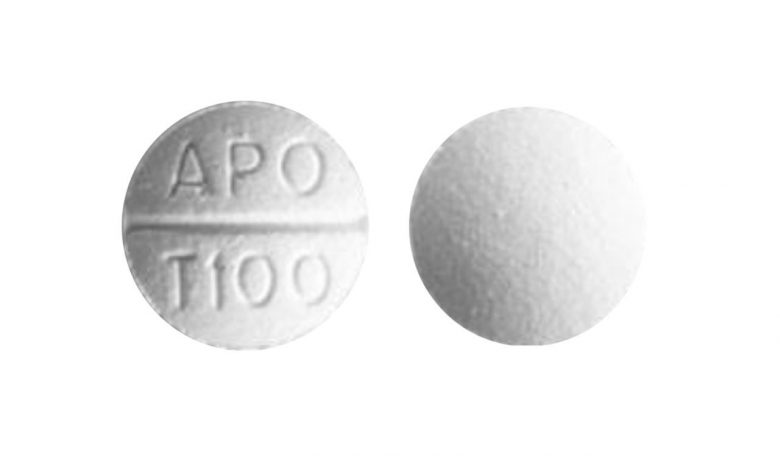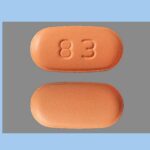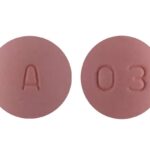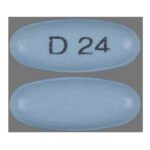APO T100 Pills: Uses, Dosage, Side Effects, Interactions

The white, round pill with the imprint APO T100 is has been identified as Trazodone Hydrochloride 100 mg supplied by Apotex Corp.. APO T100 is used to treat depression. APO T100 is in a class of medications called serotonin modulators. It works by increasing the amount of serotonin, a natural substance in the brain that helps maintain mental balance.
APO T100 is also sometimes used to treat insomnia and schizophrenia (a mental illness that causes disturbed or unusual thinking, loss of interest in life, and strong or inappropriate emotions); anxiety (excessive worry). APO T100 is also sometimes used to control abnormal, uncontrollable movements that may be experienced as side effects of other medications and for the management of alcohol dependence. Talk to your doctor about the possible risks of using this medication for your condition.
This medication may be prescribed for other uses. Ask your doctor or pharmacist for more information.
What should I discuss with my healthcare provider before taking APO T100?
You should not use APO T100 if you are allergic to Trazodone.
Do not use APO T100 if you have used an MAO inhibitor in the past 14 days. A dangerous drug interaction could occur. MAO inhibitors include isocarboxazid, linezolid, methylene blue injection, phenelzine, rasagiline, selegiline, tranylcypromine, and others.
After you stop taking APO T100, you must wait at least 14 days before you start taking an MAOI.
Tell your doctor if you have ever had:
• liver or kidney disease;
• heart disease, or a recent heart attack;
• a bleeding or blood clotting disorder;
• seizures or epilepsy;
• narrow-angle glaucoma;
• long QT syndrome;
• drug addiction or suicidal thoughts; or
• bipolar disorder (manic depression).
Be sure your doctor knows if you also take stimulant medicine, opioid medicine, herbal products, or medicine for depression, mental illness, Parkinson’s disease, migraine headaches, serious infections, or prevention of nausea and vomiting. These medicines may interact with APO T100 and cause a serious condition called serotonin syndrome.
Some young people have thoughts about suicide when first taking an antidepressant. Your doctor should check your progress at regular visits. Your family or other caregivers should also be alert to changes in your mood or symptoms.
Ask your doctor about taking this medicine if you are pregnant. It is not known whether APO T100 will harm an unborn baby. However, you may have a relapse of depression if you stop taking your antidepressant. Tell your doctor right away if you become pregnant. Do not start or stop taking this medicine without your doctor’s advice.
If you are pregnant, your name may be listed on a pregnancy registry to track the effects of APO T100 on the baby.
It may not be safe to breastfeed while using this medicine. Ask your doctor about any risk.
APO T100 is not approved for use by anyone younger than 18 years old.
How should APO T100 be used?
APO T100 comes as a tablet to take by mouth. The tablet is usually taken with a meal or light snack two or more times a day, the maximum dose is 400 mg daily. To help you remember to take APO T100, take it around the same time(s) every day. Follow the directions on your prescription label carefully, and ask your doctor or pharmacist to explain any part you do not understand. Take APO T100 exactly as directed. Do not take more or less of it, take it more often, or take it for a longer time than prescribed by your doctor.
Swallow the tablets whole or broken in half on the score mark.
Your doctor may start you on a low dose of APO T100 and gradually increase your dose, not more than once every 3 to 4 days. Your doctor may decrease your dose once your condition is controlled.
APO T100 controls depression but does not cure it. It may take 2 weeks or longer before you feel the full benefit of APO T100. Continue to take APO T100 even if you feel well.
Do not stop taking APO T100 without talking to your doctor. If you suddenly stop taking APO T100, you may experience withdrawal symptoms such as dizziness; nausea; headache; confusion; anxiety; agitation; difficulty falling asleep or staying asleep; extreme tiredness; seizures; pain, burning, or tingling in the hands or feet; frenzied or abnormally excited mood; ringing in the ears, or sweating. Your doctor will probably decrease your dose gradually.
What happens if I miss a dose?
Take the medicine as soon as you can, but skip the missed dose if it is almost time for your next dose. Do not take two doses at one time.
What happens if I overdose?
Seek emergency medical attention or call the Poison Help line at 1-800-222-1222. An overdose of APO T100 can be fatal when it is taken with alcohol, barbiturates such as phenobarbital, or sedatives such as diazepam (Valium).
Overdose symptoms may include extreme drowsiness, vomiting, penis erection that is painful or prolonged, fast or pounding heartbeat, seizure (black-out or convulsions), or breathing that slows or stops.
What should I avoid while taking APO T100?
Do not drink alcohol. Dangerous side effects or death could occur.
Avoid driving or hazardous activity until you know how this medicine will affect you. Your reactions could be impaired.
Avoid getting up too fast from a sitting or lying position, or you may feel dizzy.
APO T100 side effects
APO T100 can cause mild or serious side effects. The following list contains some of the key side effects that may occur while taking APO T100. This list does not include all possible side effects.
For more information on the possible side effects of APO T100, or tips on how to deal with a troubling side effect, talk with your doctor or pharmacist.
More common side effects
The more common side effects of APO T100 can include:
• swelling
• sleepiness
• dizziness
• diarrhea
• stuffy nose
• weight loss
• blurred vision
These effects may go away within a few days or a couple of weeks. If they’re more severe or don’t go away, talk to your doctor or pharmacist.
Serious side effects
Call your doctor right away if you have serious side effects. Call 911 if your symptoms feel life-threatening or if you think you’re having a medical emergency. Serious side effects and their symptoms can include the following:
• Thoughts of suicide and worsening depression. Symptoms include:
o thoughts about suicide or dying
o attempts to die by suicide
o new or worse depression
o new or worse anxiety
o feeling very agitated or restless
o panic attacks
o insomnia (trouble sleeping)
o new or worse irritability
o acting aggressive, angry, or violent
o acting on dangerous impulses
o mania (an extreme increase in activity and talking)
o other unusual changes in behavior or mood
• Serotonin syndrome. Symptoms include:
o agitation
o confusion or trouble thinking
o hallucinations (seeing or hearing something that isn’t there)
o problems with coordination
o fast heart rate
o tight muscles
o trouble walking
o nausea
o vomiting
o diarrhea
• Vision problems. Symptoms include:
o eye pain
o changes in your vision, such as blurred vision or visual disturbances
o swelling or redness in or around your eye
• Irregular or fast heartbeat
• Low blood pressure. Symptoms include:
o dizziness or fainting when you change positions, such as standing up from a sitting position
• Unusual bruising or bleeding
• Erection that lasts longer than 4 hours
• Hyponatremia (low sodium in your blood). Symptoms include:
o headache
o weakness
o confusion
o trouble concentrating
o memory problems
o feeling unsteady when you walk
What medication may interact with APO T100?
APO T100 oral tablet can interact with several other medications. Different interactions can cause different effects. For instance, some can interfere with how well a drug works, while others can cause increased side effects.
Below is a list of medications that can interact with APO T100. This list does not contain all drugs that may interact with APO T100.
Before taking APO T100, be sure to tell your doctor and pharmacist about all prescriptions, over-the-counter, and other drugs you take. Also tell them about any vitamins, herbs, and supplements you use. Sharing this information can help you avoid potential interactions.
If you have questions about drug interactions that may affect you, ask your doctor or pharmacist.
Drugs you should not use with APO T100
Do not take these drugs with APO T100. Doing so can cause dangerous effects in your body. Examples of these drugs include:
• Monoamine oxidase inhibitors (MAOIs), such as isocarboxazid, phenelzine, tranylcypromine, or selegiline. You shouldn’t take APO T100 with MAOIs or within 14 days of taking them. Taking these drugs together raises your risk for serotonin syndrome.
Interactions that can cause more side effects
Taking APO T100 with certain medications may cause more side effects. These drugs include:
• Central nervous system (CNS) depressants such as pentobarbital and secobarbital. APO T100 may make your response to barbiturates and other CNS depressants stronger.
• Warfarin. Taking APO T100 with warfarin can increase your risk of bleeding. Your doctor will watch you closely.
• Nonsteroidal anti-inflammatory drugs (NSAIDs) or aspirin. APO T100 may increase your risk of bleeding when used with these drugs.
• Depression drugs, such as citalopram, fluoxetine, paroxetine, sertraline, venlafaxine, duloxetine, and St. John’s wort. Taking these drugs together may increase your risk of serotonin syndrome. This condition can be life-threatening.
• Digoxin. Taking APO T100 with digoxin may increase the levels of digoxin in your body. This could increase your risk of side effects from digoxin. These include vomiting, dizziness, vision problems, and irregular heart rate. Your doctor may monitor the level of digoxin in your blood if you take these drugs together.
• Phenytoin. Taking APO T100 with phenytoin may increase the levels of phenytoin in your body. This could increase your risk for side effects from phenytoin. These include constipation, changes in mood, confusion, and balance problems. Your doctor may monitor the level of phenytoin in your blood if you take these drugs together.
• Ketoconazole or ritonavir. The level of APO T100 in your body may increase if you take it with ketoconazole, ritonavir, or other drugs that increase levels of APO T100. This can increase your risk of side effects from APO T100. These include serotonin syndrome and vision problems. Your doctor may lower your APO T100 dosage if you take drugs that can increase APO T100 levels.
Interactions that can make drugs less effective
Certain drugs may decrease the levels of APO T100 in your body and make your dosage of APO T100 less effective. You doctor may need to increase your dosage of APO T100 when you take it with these drugs.
These drugs include:
• Phenytoin and carbamazepine





